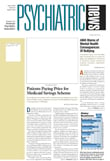Ten years of making—and remaking—the federal government’s guidelines for how physicians must document “evaluation and management” of patients for Medicare payment could be unmade entirely.
That’s if the government heeds its own broad-based advisory committee on regulatory reform urging that the “E&M” documentation guidelines be scrapped.
The Department of Health and Human Services (HHS) Advisory Committee on Regulatory Reform recommended dumping the guidelines at a recent meeting in Denver. The 21-member committee has five physicians, including Nancy Nielsen, M.D., vice speaker of the AMA’s House of Delegates, as well as administrators of the Centers for Medicare and Medicaid Services (formerly the Health Care Financing Administration).
The recommendation awaits action by HHS Secretary Tommy G. Thompson.
The guidelines for evaluation and management of patients are part of the government’s resource-based relative value scale for determining physician payment under the Medicare program and have been the object of heated controversy. Physician groups hailed the recommendation as long overdue.
“The AMA has repeatedly informed HHS and the Regulatory Relief Advisory Committee that physicians identify E&M documentation guidelines as the single, largest paperwork burden imposed by the Medicare program,” the AMA said following the committee’s recommendation.
Chester Schmidt, M.D., chair of APA’s Committee on RBRVS, Codes, and Reimbursement, echoed that view.
“This is a very positive development,” he said. “The reason this panel is backing off is the very intense pressure that has been brought to bear to change the documentation requirements. Physicians believe that the guidelines are not clinically relevant and that they are merely a means for the government to do audits and to find fault, resulting either in civil or criminal actions [against doctors] because of documentation deficiencies.”
Schmidt added, “The outcry from all specialties has consistently been that the E&M coding guidelines are not clinically relevant, are onerous, and impose on physicians extra paperwork for which there is no reimbursement.”
Psychiatrists use the E&M codes for inpatient and partial hospitalization, consultation, nursing home visits, and some office visits. Especially controversial are the guidelines for determining the level of “medical decision making,” which is one of the three E&M components, along with history taking and examination. The guidelines for that component use a four-by-four grid designed to produce a numerical approximation of medical decision making.
Schmidt has called the system so complex “it bears no resemblance to the actual practice of medicine.”
Douglas L. Wood, M.D., chair of the advisory committee and a physician at the Mayo Clinic, summed up the view that the decade-long effort to revise or improve the guidelines has been exhausted.
“The documentation guidelines that have been used are unworkable, and I think 10 years of effort to try to find one that works is a pretty strong statement that there is something fundamentally difficult or fundamentally impossible about trying to create documentation guidelines for evaluation and management services,” Wood said, according to transcripts of the advisory committee meeting in Denver.
“The fact that no other commercial insurer uses them should be a pretty strong statement that they’re probably not applicable anyway,” Wood said. “And indeed, there is now and has been an adversarial environment that’s based on fraud and abuse actions and the actions of Medicare carrier medical directors.”
The transcript of the Denver meeting is posted on the Web at www.regreform.hhs.gov/sacrr5_16.htm. ▪
